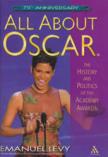Hooray for Whom?
If history is bunk, any history of the Oscars is full of it. We all know designation as Best Picture hardly means a film was the best movie of the year. As Emanuel Levy readily concedes in All About Oscar, Hollywood’s decision making has always been flawed; and, as he details in some excellent chapters, it is even more so now given the sophisticated PR campaigns run each year and the massive funding behind them.
Levy’s book is right on the money (and on the bunk), and right that the Oscars deserve analysis. Although Levy does not claim this, Aristotle made up the first awards list (Poetics, VI): Each drama has six aspects on which its quality depends: action, character, speech, spectacle, melody, and mind.
Some might squirm at my pairing of Aristotle and the Academy. But films are no worse in their mindlessness than any other medium; and if Aristotle can be applied to plays, he can be applied equally to screenplays (with Best Picture awards for action, Best Actor for character, etc.). Aristotle’s qualities are as prophetic as his famous warning, which Levy often echoes, about too much spectacle. Aristotle might just wonder: Where is your Oscar for mind?
Levy is mindful; as a former staffer for Variety and editor of Film International, he is among the best-informed writers about the Oscars. Few others can match his wit. This is his third book on the awards (cf. Falstaff: Tis no sin for a man to labor in his vocation). Parts of And the Winner Is...(1990) and Oscar Fever (2001) are reworked here. Levy has updated them and added new chapters (The Luck of the British, The Foreign-Language Winners, The Importance of Being Eccentric, Is Oscar a White Man’s Award? and others). He closes with updated tables, making the book both a social history and database.
Levy provides astute observations, many on acting, his strong suit. Beware winning Best Actor or Best Actress, he warns: you get typecast. Best Actress winners, he shows, are awarded Oscars in their 20’s, and Best Actors in their 40’ssymbolic, he says, of our stereotypes for Beauty and Power. He points out that movies with meaty roles get the bulk of the awards, even technical ones, because of an oddity: although only directors, cinematographers and others can vote to select nominees in their respective categories, anyone can vote for the final winner. Thespians outnumber all other voters and favor movies with strong character. They also love all the films about show business, especially traumas in actors’ lives.
Levy is especially good on why the Brits win Oscars and ably traces the advantages of British actors over American. The former can work in theater, television and film, all concentrated in London, not split between two cities, New York and Los Angeles. As he discusses the last two decades, moreover, he stresses two contrasts, one between British and American filmmakers and another between studios and indies, small independent production companies.
But there is a larger contrast between awards given to indies and all foreign films, including British, as opposed to the awards to major studios. Perhaps because he updates his books instead of rewriting them, Levy misses some of this big picture. The New York Times noted in December that this year’s likely Oscar nominees come from films made in New York or overseas. But the trend and its cause are old, as the nickname for 1997, The Year of the Indie, makes clear. In 1998, it was the Year of Miramax, an independent studio, whose Shakespeare in Love won a glut of awards; its Life Is Beautiful became only the second foreign-language film nominated for Best Picture. Roberto Benigni won Best Actor.
For 20 years, the Oscars have been less and less about Hollywood: a large share of nominations and awards have gone to films produced not by a major Hollywood studio, but odd English ventures and American mavericks. Witness Best Picture in the 1980’s. With Chariots of Fire (1982), Amadeus (1984), Platoon (1986) and The Last Emperor (1987), studio involvement was nil or minimal. Studios sometimes got involved when they sensed a hitnot making a film, but later, when honor beckoned, distributing it. Studios coveted independents, and Disney acquired Miramax in 1999, but the Mouse, so to speak, was just jumping on the Bard.
Here is the paradox that Levy understates: Hollywood generally now honors films that it won’t make. The most frequent honoree in the last quarter century has not been a famous actor or studio but Saul Zaentz, freelance producer of The English Patient, One Flew Over the Cuckoo’s Nest and Amadeus.
In the old days, studio headsthe Lanskys, Goldwyns and Warners, often émigrés from Eastern Europemay not have had great taste. But as Levy and others have noted, they understood class and, in an old world way, the place of art in culture. They wanted to make great movies. They inherited and shaped a movie industry still indebted to theater, even if it had to free itself of theatrical technique to attain cinematic dynamism on its own terms.
Now M.B.A.’s have usurped moguls: the two words they understand are profit and Kaboom! The contrast between old and new Hollywood is central to the Oscar story. Perhaps with his next book, Levy will define it. With Chicago, Gangs of New York and The Hoursall from Miramax, with the last co-financed by Paramountindependents again dominate the nominees. As La Rochefoucauld said, Hypocrisy is the tribute vice pays to virtue.
This article also appeared in print, under the headline “Hooray for Whom?,” in the March 10, 2003, issue.








